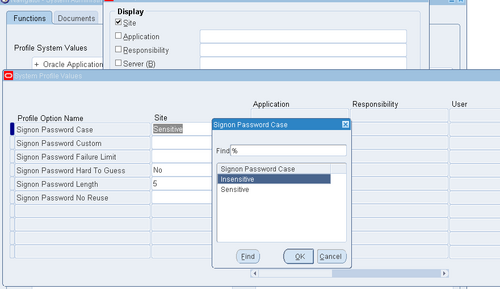Case Sensitivity in Oracle Applications User Passwords

Case Sensitivity in Oracle Applications User Passwords In previous releases of Oracle Applications, user passwords were treated as case insensitive. Now, Oracle Applications user passwords can optionally be treated as case sensitive, depending on the mode you choose.
Case-sensitivity in passwords is controlled by the site-level profile option Signon Password Case. This profile has two possible settings:
Sensitive – Passwords are stored and compared as they are, with the password case preserved. During comparison, if the entered password does not match the decrypted version, then an error message is displayed. With Release 12, this option is the default behavior. All newly created or changed passwords are treated as case sensitive.
Note: Users who have not changed their passwords since the installation of release 12 are not affected until they do change their passwords.
A password expiration utility is available if the System Administrator requires that all users convert to case sensitive passwords upon the next login. This utility expires all passwords in FND_USER, including that of SYSADMIN and default Vision accounts, and can be run as a SQL Script ($FND_TOP/sql/AFCPEXPIRE.sql) or as a Concurrent Program (FNDCPEXPIRE_SQLPLUS).
Insensitive (or unset) – Passwords are treated as case insensitive. In Insensitive mode, passwords are stored and compared in uppercase, similar to that in earlier releases. The entered password and the decrypted password are converted to uppercase prior to comparison.
If you want to preserve case insensitivity in passwords, i.e. retain the behavior from previous releases, ensure that Signon Password Case value is either set to ‘Insensitive’, or not set at all.
There are no upgrade or data migration issues with this new feature. The profile option affects only how new passwords are stored. Existing passwords are tested using the policy in effect when they were created.

Leave a Reply
Want to join the discussion?Feel free to contribute!